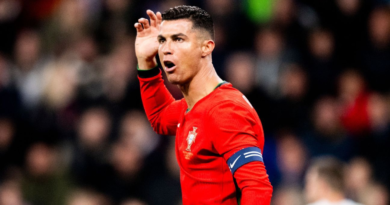Clawson resigns as Wake coach, becomes advisor
Wake Forest head football coach Dave Clawson is stepping down after 11 seasons and is expected to remain with the university in an advisory role, sources told ESPN on Monday.
The advisory role will include working with athletic director John Currie, the school president and board of trustees on athletics issues. Clawson is also expected to play a big role in fundraising at the school, sources told ESPN.
Clawson led Wake Forest to seven consecutive bowl games during a run that included top-10 appearances in 2021 and 2022. Those are the highest Associated Press poll rankings in Wake Forest history.
The decision to step down was Clawson’s, sources told ESPN, as he felt it was time. Sources compared the decision to recent moves made by Virginia basketball coach Tony Bennett and former Washington football coach Chris Petersen, who both stepped away in part because of the changing era in the sport.
Clawson had been mulling the decision in recent weeks, sources said, and had been in communication with school officials about it before formally notifying them Monday.
Clawson, 57, is expected to take a year off from coaching to recharge and refresh after working as a head coach for 25 of the past 26 seasons. He’s the only coach in NCAA history to lead four Division I programs — Fordham, Richmond, Bowling Green and Wake Forest — to double-digit wins in a season. He has turned down interest from multiple schools’ head coaching jobs over the years, opting to stay at Wake Forest.
Clawson is regarded as the school’s best modern coach. He leaves with a record of 67-69, the best winning percentage of any Wake Forest football coach since the school joined the ACC in 1953. He led Wake Forest to seven of the 17 bowl games in school history and five of the school’s 11 total bowl wins.
Clawson’s highlights include taking Wake Forest to the ACC title game in 2021, leading the Demon Deacons to three consecutive wins over Florida State from 2019 to 2021, and getting a victory over Texas A&M in the Belk Bowl.
The headwinds of the current era of college football over the past two years at Wake Forest complicated how Clawson built teams. He’d redshirt players to have older rosters, and leaned on continuity and player development as competitive advantages. The inability to retain top talent financially, due to NIL and the transfer portal, has blunted the effectiveness of Wake Forest’s edges.
There have been plenty of breadcrumbs to Clawson’s frustration, and he has hinted at Wake Forest’s NIL limitations as the Demon Deacons have gone 4-8 in each the past two seasons.
After a loss to Louisiana of the Sun Belt earlier this season, Clawson explained his frustration: “To fix problems, you need a lot of money. And we recruited what we could afford.”
Wake Forest members believed that in some games this season, individual players on the opposing team had bigger NIL deals than Wake Forest’s entire roster. NIL numbers aren’t public, which make such claims difficult to verify, but Wake’s NIL was believed to be near the bottom of the 17-team ACC.
For the 2023 season, Wake Forest star quarterback Sam Hartman left to play his final season of eligibility at Notre Dame. Clawson needled Notre Dame for a video tribute to Hartman on Senior Night, saying, “Here’s a guy that we recruited and we developed and they’re putting a video on him saying, ‘We will always love you.'”
He added: “You only dated him a couple of months. It can’t be love. We’re the ones that love him. We had five years with him. You rented him for a season. … When that video played, it was like, ‘Holy cow, this is where college football is.'”
The tenor of those comments popped up multiple times this season as Wake lost key defenders to either the transfer portal or early entry into the NFL draft because it couldn’t afford the market rate for them. Overall, Wake Forest has lost more than a dozen starters the last two-and-a-half years to the portal or the draft.
In recent comments about Mack Brown’s departure at North Carolina, Clawson offered some unintentional insight into a factor on his own decision.
“It’s just the direction in which things are headed,” Clawson said in late November. “Many players now, if they don’t have the exact role they want by Years 2 or 3, are likely to leave. In some cases, that works out for them, and in others, it doesn’t.
“I believe that with a lot of the players who left, if they had just stayed one more year and been patient, their roles here would have probably aligned with what they wanted.”



